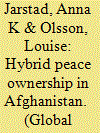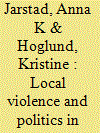| Srl | Item |
| 1 |
ID:
110239


|
|
|
|
|
| Publication |
2012.
|
| Summary/Abstract |
What does local ownership actually entail in the context of an international peace operation supporting sustainable development and stability? Who should own what? Moreover, when should local ownership be introduced? Using the case of Afghanistan as a fruitful example, this article suggests that ownership is key for understanding the interactions between international and local actors as it highlights the asymmetry of this power relation. In all three types of roles that the international actors can perform-intervenor, mentor, or facilitator-such an asymmetric power relation exists. For Afghanistan, the result of the different approaches to local ownership has been a complex form of hybrid peace ownership where the international actors have become intertwined in almost all aspects of Afghan life. As the international actors are decreasing their involvement by moving from the role of intervenor to the role of mentor, the sustainability of development and stability in Afghanistan will undoubtedly be put to the test.
|
|
|
|
|
|
|
|
|
|
|
|
|
|
|
|
| 2 |
ID:
139236


|
|
|
|
|
| Summary/Abstract |
This article analyses the narratives of survivors of violence in KwaZulu-Natal, South Africa, and addresses the relationship between local violence, politics and agency in a post-conflict setting. In particular, the study advances an understanding of how local political violence serves to increase or decrease agency. In line with previous research on emotions and agency, our study suggests that fear and anxiety encourage risk avoidance and have a pacifying effect on survivors of violence. It also indicates that anger and enthusiasm are emotions experienced by those who have a strong sense of agency and have become politically mobilised after violence. The study contributes to the debate on local capacity for peacebuilding and democracy by showing how local agency is affected by violence and how survivors of violence can become agents of change through politics.
|
|
|
|
|
|
|
|
|
|
|
|
|
|
|
|